This topic gives you step-by-step instructions to make your email messages and calendar events accessible to people with disabilities.
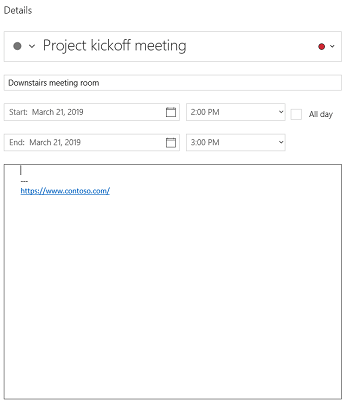
People who are blind or have low vision can understand your email messages and calendar events more easily if you create them with accessibility in mind.
Best practices for making email and calendar events accessible
The following table includes key best practices for creating Mail for Windows 10 email and Calendar for Windows 10 events that are accessible to people with disabilities.
| What to fix | Why fix it | How to fix it |
|---|---|---|
| Include alternative text with all visuals. Visual content includes pictures, SmartArt graphics, shapes, groups, charts, embedded objects, ink, and videos. | Alt text helps people who can't see the screen to understand what's important in images and other visuals. Avoid using text in images as the sole method of conveying important information. If you must use an image with text in it, repeat that text in the document. In alt text, briefly describe the image and mention the existence of the text and its intent. | |
| Add meaningful hyperlink text. | People who use screen readers sometimes scan a list of links. Links should convey clear and accurate information about the destination. For example, instead of linking to the text Click here, include the full title of the destination page. | |
| Ensure that color is not the only means of conveying information. | People who are blind, have low vision, or are colorblind might miss out on the meaning conveyed by particular colors. For example, add an underline to color-coded hyperlink text so that people who are colorblind know that the text is linked even if they can't see the color. For headings, consider adding bold or using a larger font. | |
| Use sufficient contrast for text and background colors. | The text in your email should be readable in High Contrast mode so that everyone, including people with visual disabilities, can see it well. For example, use bright colors or high-contrast color schemes on opposite ends of the color spectrum. White and black schemes make it easier for people who are colorblind to distinguish text and shapes. | |
| Use a larger font size (11pt or larger), sans serif fonts, and sufficient white space. | People who have dyslexia describe seeing text "swim together" on a page (the compressing of one line of text into the line below). They often see text merge or distort. For people who have dyslexia or have low vision, reduce the reading load. For example, they may benefit from familiar sans serif fonts such as Arial or Calibri. Avoid using all capital letters and excessive italics or underlines. Include ample white space between paragraphs. | |
| Use built-in headings and styles. | To preserve tab order and to make it easier for screen readers to read your email or calendar event, use a logical heading order and the built-in formatting tools in Mail for Windows 10 and Calendar for Windows 10. For example, organize headings in the prescribed logical order. Use Heading 1, Heading 2, and then Heading 3, rather than Heading 3, Heading 1, and then Heading 2. And, organize the information into small chunks. Ideally, each heading would include only a few paragraphs. | |
| Use a simple table structure, and specify column header information. | Screen readers keep track of their location in a table by counting table cells. If a table is nested within another table or if a cell is merged or split, the screen reader loses count and can't provide helpful information about the table after that point. Blank cells in a table could also mislead someone using a screen reader into thinking that there is nothing more in the table. Screen readers also use header information to identify rows and columns. |
Add alt text to visuals
Add alt text to visuals, such as pictures, screenshots, icons, videos, and 3D models, so that screen readers can read the text to describe the visual to users who can't see it.
Note: You cannot add alt text in Calendar for Windows 10.
-
Select a visual, and then select Picture > Alt Text.
-
Type the Title and Description to describe the image and its context to someone who cannot see it.

Add hyperlink text
-
Select the text to which you want to add the hyperlink.
-
In Mail, select Insert > Link. In Calendar, select Format > Link. The text you selected displays in the Text to display box. This is the hyperlink text.
-
If necessary, change the hyperlink text. In the Address box, type the destination URL.
Tip: If the title on the hyperlink's destination page gives an accurate summary of what's on the page, use it for the hyperlink text. For example, this hyperlink text matches the title on the destination page: Templates and Themes for Office Online.
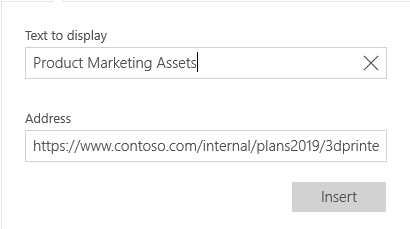
Use accessible font format
-
Select your text.
-
Select the Format tab.
-
Select your formatting choices for font type, size, style, and color.

Use accessible font color
To ensure that text displays well in High Contrast mode, use the Automatic setting for font colors.
Note: You cannot use Automatic font color in Calendar for Windows 10. You should pick high-contrast colors such as black and white manually.
-
Select your text.
-
Select the Format tab.
-
Select the Font Color button.
-
Select Automatic.
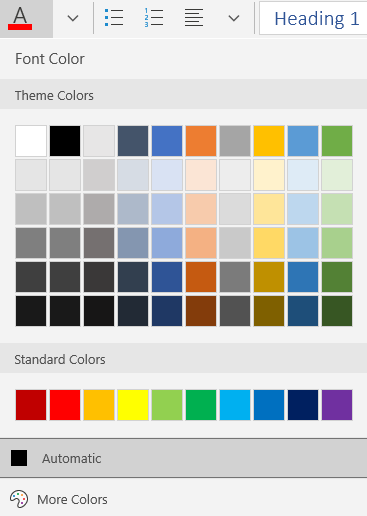
Use bulleted list styles
Create bulleted lists by using the Bullets button.
Note: Calendar for Windows 10 only has one bulleted style.
-
Position the cursor anywhere in your email.
-
Select the Format tab.
-
Select the Bullets button, and select the style you want.
-
Type each bullet item in the bulleted list.
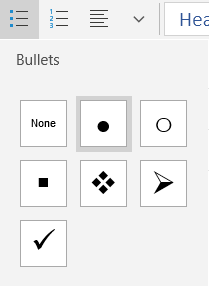
Use ordered lists
Create sequential steps by using the Numbering button.
Note: Calendar for Windows 10 only has one ordered style.
-
Position the cursor anywhere in your email.
-
Select the Format tab.
-
Select the Numbering button, and select the style you want.
-
Type the sequential steps.
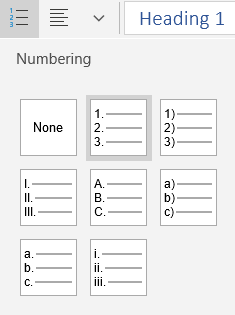
Use table headers
Specify a header row in a table.
-
Position the cursor anywhere in a table.
-
Select Table > Style Options, and then select the Header Row option.
-
Type your column headings.
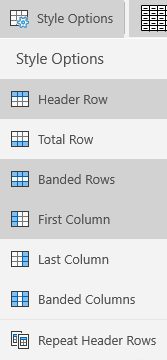
See also
Rules for the Accessibility Checker
Make your Word documents accessible to people with disabilities
Make your Excel documents accessible to people with disabilities
Make your PowerPoint presentations accessible to people with disabilities
Technical support for customers with disabilities
Microsoft wants to provide the best possible experience for all our customers. If you have a disability or questions related to accessibility, please contact the Microsoft Disability Answer Desk for technical assistance. The Disability Answer Desk support team is trained in using many popular assistive technologies and can offer assistance in English, Spanish, French, and American Sign Language. Please go to the Microsoft Disability Answer Desk site to find out the contact details for your region.
If you are a government, commercial, or enterprise user, please contact the enterprise Disability Answer Desk.
No comments:
Post a Comment